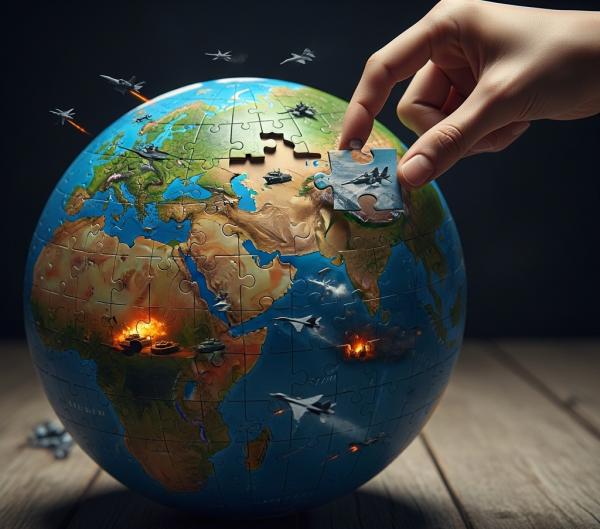World War III being fought piecemeal?

I don't blame you if you think we're drifting into World War III—bit by bit. Who knows? Things could go catastrophic overnight. Better to brace for the worst than count on the best.
When people hear the phrase “World War III,” they usually imagine a single dramatic moment that sets the whole world on fire—like a surprise invasion or a nuclear strike. But what if a third world war doesn't begin with a single spark? What if it is already happening, not as one huge explosion, but as many smaller battles that slowly add up?
Some world leaders, including the late Pope Francis, have warned that today's conflicts look like a “piecemeal” world war. Instead of a single event like the assassination in Sarajevo that triggered World War I, we see several crises breaking out in different regions. None of them alone might be called a world war, but together they start to look like one.
The war in Ukraine is the clearest example. Russia invaded Ukraine in February 2022, claiming security concerns and historic ties. At first glance it seems like a fight between two neighboring countries. But look closer, and you see almost every major power getting involved.
The United States and its NATO allies send Ukraine weapons, training, and intelligence. They've also put heavy economic sanctions on Russia, hoping to weaken its ability to fight. Russia, meanwhile, calls this a fight for survival against the West and warns it will use “all means necessary” to defend itself. Even though NATO soldiers are not officially fighting Russian soldiers, the amount of money, weapons, and strategy being exchanged makes it feel like a proxy war—a war where two big powers fight each other indirectly through a third country.
China in the Background
While Russia battles Ukraine and faces Western pressure, China is watching carefully. It has not officially sent troops, but it openly trades with Moscow, buys its oil at a discount, and supplies technology and goods that keep the Russian economy afloat. China also has its own tensions with the United States, especially over Taiwan. Many experts believe the U.S. response in Ukraine is partly meant to send a message to China: if you attack Taiwan, expect a united and determined West.
This creates a dangerous triangle. If Russia and China decide they need each other to stand up to the West, they might form a stronger partnership. The United States would then face two powerful rivals working together. That doesn't mean China and Russia are best friends—they have their own disagreements—but pressure from the West pushes them closer.
Fighting Without Calling It War
One reason this situation feels so unsettling is that it doesn't look like the world wars we learn about in history class. There is no formal declaration of war between NATO and Russia, or between the U.S. and China. Instead, countries fight in less obvious ways.
Cyberattacks can shut down power grids or steal military secrets. Sanctions can freeze bank accounts and block trade. Drones can strike targets far away with no soldiers on the ground, while gas pipelines can mysteriously explode. All these actions have already occurred. Each one is aggressive, yet leaders describe them as “counter-measures” or “support,” not "acts of war."
Because no one wants to admit they are at war, they escalate slowly—sending slightly better weapons, adding another round of sanctions, or conducting another “training exercise” near someone else's border. Each move on its own may not seem like a big deal, but together they keep raising the temperature.
The Economic Battlefield
This hidden war is not just military. It's also economic. Western countries have blocked Russian banks from using the international payment system and restricted sales of high-tech equipment like computer chips. Russia fights back by cutting energy supplies to Europe and finding new markets in Asia.
China, watching all this, is working to protect itself in case it faces similar sanctions in the future. It is building new trade routes, collecting rare minerals, and developing its own technology. Countries in Africa, Latin America, and the Middle East sometimes refuse to take sides, instead trading with both camps. The world is splitting into competing groups, but the lines are blurry.
Why Ukraine Matters to Everyone
The outcome of the Ukraine war will send a message far beyond Europe. If Russia manages to keep the land it has taken or forces Ukraine into a frozen conflict, other countries might believe that military force works—even against Western resistance. If Ukraine, with NATO's help, pushes Russia back, leaders in places like Beijing might think twice before starting their own wars.
But the war is long and costly. Some voters in the United States and Europe are getting tired of paying for it. If Western support fades, Ukraine could be pressured into a bad peace deal, or NATO might try riskier strategies to end the war quickly. Each new step—sending longer-range missiles, approving fighter jets—brings the world a little closer to direct confrontation between nuclear powers.
A War of Small Fires
Think of today's conflicts as small fires breaking out around the globe. Besides Ukraine, there are tensions over Taiwan, disputes in the South China Sea, cyberattacks on critical infrastructure, and battles for rare minerals in Africa. Each fire seems separate, but they all feed on the same fuel: the struggle over who will set the rules for the 21st-century world.
Because the flames appear in different places at different times, leaders can pretend each one is just a local problem. That makes it harder to see the bigger picture—or to negotiate a broad peace. History shows that “limited” conflicts can still trigger global disasters. The Balkan wars before World War I and the Spanish Civil War before World War II both started small but foreshadowed something much larger.
Why This Matters for Our Generation
Young people today were born after the Cold War and may not remember the 9/11 attacks. A world war sounds like ancient history. But decisions made in far-away capitals affect everyone. Economic sanctions can raise gas and food prices. Cyberattacks can disrupt social media, banking, or even hospitals. And if nuclear powers miscalculate, the consequences would be global and immediate.
The scary part is that this slow, piecemeal conflict is easy to ignore until it's too late. There may never be a single headline—“World War III Begins”—to wake us up. Instead, we could drift into a world where multiple crises merge into one big disaster.
Choosing a Different Path
Is a Third World War inevitable? No. I am reasonably optimistic, although I will recognize, rather than deny, the lurking danger. I won't pretend that each crisis is isolated, because the probable domino effect is real.
The lesson for our generation is clear. We don't have to accept a future of endless conflict.
Understanding how today's “small” wars connect can help citizens in the free world—and perhaps the whole world—demand smarter policies and push for real diplomacy. World War III doesn't have to start with a bang, but stopping it will take awareness and action long before the pieces add up.
Author: renqiulan
